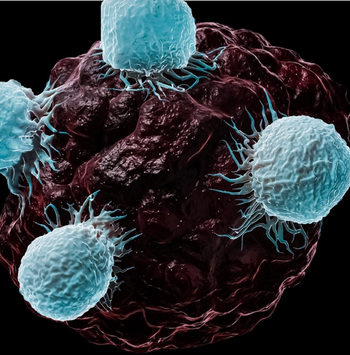
Having a pet to care for may motivate patients to exercise and be positive when undergoing cancer treatment.

Darlene Dobkowski, Managing Editor for CURE® magazine, has been with the team since October 2020 and has covered health care in other specialties before joining MJH Life Sciences. She graduated from Emerson College with a Master’s degree in print and multimedia journalism. In her free time, she enjoys buying stuff she doesn’t need from flea markets, taking her dog everywhere and scoffing at decaf.

Having a pet to care for may motivate patients to exercise and be positive when undergoing cancer treatment.

Patients and their caregivers can navigate a terminal cancer diagnosis while keeping dignity intact.

Patients can now prioritize whether durable responses to treatment or avoiding certain side effects are more valuable to them.

Darzalex Faspro has received FDA approval for use in combination with pomalidomide and dexamethasone for patients with multiple myeloma who previously received one line of therapy.

Agent Orange exposure impacted millions of U.S. military personnel during the Vietnam War. The chemical may have led to bladder cancer diagnoses later in life.

As rates of merkel cell carcinoma increase, patients should be aware of the risk factors and symptoms of this skin cancer.

Donald Rumsfeld, who died from multiple myeloma, served as secretary of defense under Presidents Gerald R. Ford and George W. Bush.

Patients with metastatic KRAS G12C mutated non-small cell lung cancer now have another treatment option if they previously failed at least one line of therapy.

The combination of Imbruvica with Venclexta significantly reduced the risk for progression or death by 78% compared with chlorambucil plus obinutuzumab.

CNN’s chief international anchor announced her ovarian cancer diagnosis live on-air today, which she wants everyone to use as a call to arms for all people to undergo cancer screening.

Patients with relapsed/refractory myeloma who were previously treated with three or more therapies responded to an infusion of a novel CAR-T cell therapy up to 18 months with no new side effects compared with 12-month results of this study.

Treatment with the combination of Polivy, rituximab and lenalidomide safely conferred responses in patients with relapsed/refractory diffuse large B-cell lymphoma, with most patients still in remission at the study’s cutoff date.

Progression-free survival improved with Zejula compared with placebo in patients with BRCA-mutated ovarian cancer with no new safety signals.

The FDA approved a kinase inhibitor for the treatment of adults with previously treated, unresectable locally advanced or metastatic cholangiocarcinoma with FGFR2 fusion or other arrangement.

The agency approved Lumakras, the first targeted therapy for patients with non-small cell lung cancer and a KRAS G12C mutation, whose disease progressed after one systemic therapy.

Researchers observed no difference in overall and progression-free survival in patients with mantle cell lymphoma who started high-intensity treatment at least 90 days after receiving a diagnosis compared with a non-intensive therapy approach.

The PET imaging agent targets prostate-specific membrane antigen levels, which can improve the detection of suspected disease spread or recurrence compared with standard approaches.

For patients with early-stage, unfavorable-risk Hodgkin lymphoma, this treatment option may allow for the reduction or elimination of radiotherapy in patients without malignant disease.

This maintenance therapy approach approved progression-free survival without a major impact on quality of life in patients with newly diagnosed ovarian cancer with a BRCA mutation who recently responded to chemotherapy.

Opdivo was approved by the FDA for use if disease persisted after neoadjuvant chemoradiotherapy in these patients, which is “exciting news,” as patients would typically undergo surveillance when this occurred.

Survival rates in this study were similar across cancer types including colorectal and prostate cancers, which may indicate a need for updated policies to include more patients.

A diagnosis of diabetes, high blood pressure or cardiovascular disease within two years of being diagnosed with breast cancer impacted a woman’s risk for death related to breast cancer or cardiovascular disease.

Patients with a history of cancer may become empowered to make diet and exercise changes by attending a clinic either virtually or in-person, which may also have a long-term impact on future risk for disease and outcomes.

According to a survey of 26 patients with advanced cancer, many reported that the U.S. opioid epidemic impacted their opinions of opioid use for pain management and conversations with their clinician regarding prescriptions.

A gynecologic oncologist who has spent her career helping patients during their cancer journeys goes a step further to educate women on how to advocate for themselves and possibly prevent cancer before it occurs.

Based on findings from the KEYNOTE-811 trial, the FDA approved Keytruda for the treatment of patients with locally advanced unresectable or metastatic HER2-positive gastric or gastroesophageal junction adenocarcinoma in combination with trastuzumab and chemotherapy.

Factors including progression-free survival, duration of response and overall survival were promising at 15 months in patients with relapsed/refractory mantle cell lymphoma.

CURE Media Group also recognized Jennifer E. Giovanni, Ph.D., MSN, MPH, RN, as winner of the Finest Hour Award, which highlights the dedication and selflessness exhibited in front-line workers during the COVID-19 pandemic.

Treatment with tisotumab vedotin, a novel antibody-drug conjugate, in women with recurrent or metastatic cervical cancer, led to an objective response rate of 24% with a manageable safety profile.

Most patients with newly diagnosed multiple myeloma treated with a combination of Kyprolis, Revlimid, dexamethasone and Darzalex achieved minimal residual disease negativity during a median follow-up of 11 months.